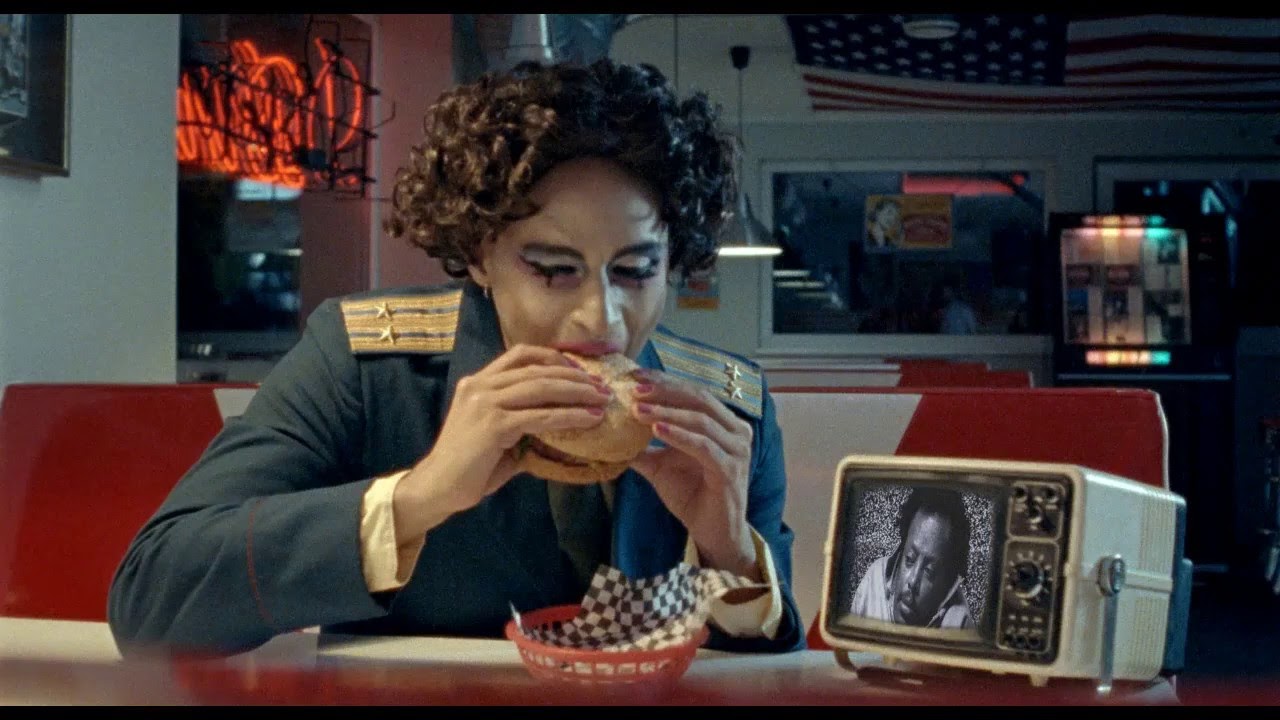Miguel Llansó’s newest feature film, Jesus Shows You the Way to the Highway, offers a jarring but mesmerizing glimpse into the strange reality surrounding our modern experience. Saturated in complex filming techniques and a constantly shifting plot, the film is a wondrous and frightening vision. Filming took three years to finish, with shots spread across Ethiopia, Latvia, Estonia, Spain, and Romania. Not only does the geography shift and warp, but also the nature of our protagonist’s reality shifts across stop motion, widescreen, and digital filming. Even the characters and their matter become unreliable in this bizarre cult tale of CIA paranoia and retro-techno saturation.
In a grimy future world where American power is still challenged by an ethereal communist presence, the Stalin virus, agent D.T. Gagano (Daniel Tadesse) must delve into the virtual reality of Psychobook. This is where agent Gagano and his partner, Agent Palmer Eldritch (Agustín Mateo), must search for and retrieve a mysterious green goo known as the Substance. Things get messy for agent Gagano and the plot of our hero quickly unravels into a strange series of unfortunate run-ins and betrayals that transgress different layers of reality. Gagano must navigate through the warped-reality of Psychobook, a meta-Batfro TV series, and the dystopia of his current world in order to uncover the mystery of the Stalin virus and get back to his girlfriend, Malin (Gerda-Annette Allikas).
Throughout the film, our resilient protagonist refuses to succumb to the battery of his warped reality, keeping faith that the “real” world is still out there, somewhere. Gagano gives us hope that even in the face of such impossible odds, we can still put up a fight. Against such oppressive and ubiquitous future systems, we are all David, and Gagano shows us that the power of Goliath is only true so long as we believe in it. Much like I’ve discussed in “Glitch and the art of letting go,” believing these future systems’ mythical status of perfection can subjugate us to their realities.

The real question that comes to me as I watch J.S.Y.W.H is, how do we escape a reality that is not of our making? I’ve suggested that a myth of imperfection may be a useful strategy, but when the future systems are glitchy and just as frail as people, how do they still command such authority? In Gangano’s case, these systems are just so confusing and ubiquitous that they spin a web that’s near impossible to break free from. In that situation, not even the glitches can serve to awaken our minds to the situation around us. Luckily there’s always the option to simply opt-out of these future systems if you look hard enough. Agent Gagano chooses this path as he strives to leave the CIA and live a simple life running a pizzeria and kickboxing studio with his love.
The desire for a CIA agent to open up a pizzeria and kickboxing studio is comical but sincere. In an increasingly complex world such a simple life is seen as unrealistic and better left untouched, yet that may be the very path that leads us out of the virtual world of Psychobook. Even in the face of constant rejection and defeat, agent Gagano doesn’t lose hope and ultimately returns from Psychobook. Though distorted and trapped in a portable TV, Gagano continues his struggle for a dream that almost feels more real than his reality. After being rejected and discarded in a back alley, fate comes around and gives Gagano one final outstretched hand.
Through an elaborate web of disjointed plot elements, wonderfully distinct filming techniques, and an array of analog and digital special effects, Miguel Llansó gives us a view into a world that may not be so different from ours. Most people can at least envision themselves living in two realities, one biological and the other digital, and it begs the question: How exactly did we get here? This film has the feeling of a Jodorowsky feature, if only he was a glitch artist. Where Jodorowsky attempts to awaken the spiritual, Llansó attempts to awaken the real that is buried under the virtual of our world. His techniques are wonderfully bizarre and comical, but add a necessary saturation to the experience, a saturation that we’ve become so accustomed to in our own ways. The hilarious and captivating film screams from the unconscious and covers us in the bilious substance of a reality that may not be very far off from our own.



